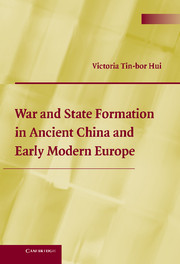Book contents
- Frontmatter
- Contents
- List of Tables and Maps
- Acknowledgments
- 1 A Dynamic Theory of World Politics
- 2 The Dynamics of International Politics in Ancient China
- 3 Rethinking the Dynamics of International Politics in Early Modern Europe
- 4 The Dynamics of State Formation and Transformation
- 5 Conclusion and Implications
- APPENDIXES
- Bibliography
- Index
5 - Conclusion and Implications
Published online by Cambridge University Press: 02 February 2010
- Frontmatter
- Contents
- List of Tables and Maps
- Acknowledgments
- 1 A Dynamic Theory of World Politics
- 2 The Dynamics of International Politics in Ancient China
- 3 Rethinking the Dynamics of International Politics in Early Modern Europe
- 4 The Dynamics of State Formation and Transformation
- 5 Conclusion and Implications
- APPENDIXES
- Bibliography
- Index
Summary
Rejoining International Politics and State Formation
This book has examined why ancient China and early modern Europe shared similar processes but reached diametrically opposite outcomes in international competition and state formation, why the ancient Chinese and early modern European trajectories experienced early convergence but eventual divergence, and why ancient China witnessed checks and balances for more than three centuries but eventually succumbed to a coercive universal empire. To answer these questions, this book has advanced a dynamic theory of world politics that can account for endogenous transformation and alternative trajectories. In essence, world politics should be seen as strategic interaction between domination-seekers and targets of domination who employ competing strategies and who are simultaneously facilitated and hindered by competing causal mechanisms. Scholars of international politics and state formation generally presume that attempts at domination are checked by the mechanism of balance of power or resistance and that of rising costs of expansion or administration. This view is not wrong but is flawed with unilinear thinking. First, effective balancing or resistance is inherently difficult because targets of domination (other states in interstate competition and societal actors in state-society struggles) face the daunting collective-action problem. Second, international competition unleashes not just countervailing mechanisms, but also coercive mechanisms. Domination-seekers can significantly enhance their coercive capabilities and lower the costs of domination by self-strengthening reforms, divide-and-conquer strategies, and Machiavellian stratagems. The term “logic of balancing” here refers to the set of countervailing mechanisms, and the “logic of domination” to the set of coercive mechanisms.
- Type
- Chapter
- Information
- War and State Formation in Ancient China and Early Modern Europe , pp. 224 - 238Publisher: Cambridge University PressPrint publication year: 2005



